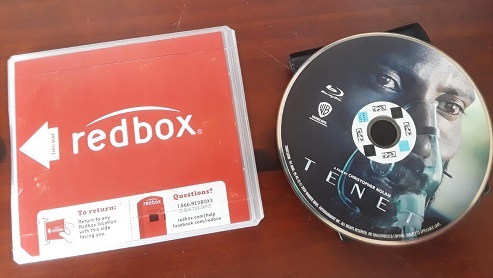I picked this up at the library today and I just finished. I thought I might watch it in stages, but I decided I needed to watch it all the way through to keep track of the story, although I did take a couple of breaks.
I liked it better than I expected to from the reviews. I could quibble with some of the time reversal mechanics, but it wasn't quite as nonsensical as I expected, and its approach to temporal physics and self-consistency was pretty good -- except that the bad guys' whole plan was to attempt a change when that shouldn't have been possible with the model the film was using. At best, per Neil's discussion of the physics, it would've split off a parallel timeline, which wouldn't have benefitted the people in the original timeline. Still, as a creative exercise in putting puzzle pieces together, it was very clever. And I'm impressed by how much of it was done with practical effects instead of CGI.
Still, this is a film I appreciate more for its concepts and production than its characters. Washington was effective, but his character was anonymous by design. The film falls short on the Bechdel Test, and having so much of it revolve around an abusive husband and his victimized wife wasn't very pleasant. Maybe it was supposed to make Sator come off as menacing, but he just seemed pathetic and cowardly to me, a small man trying to feel big by bullying his wife.
Tenet also features the most cursory and gratuitous use of Michael Caine in any Nolan film I've seen. Hardly even seemed worth bothering.
There were a few loose ends that may have been lost in editing. For instance, there was an unexplained bit about how the Protagonist thought he'd spoken on the phone to the artist Arepo, but Kat said that was impossible. I thought that in the reverse part of the movie, we'd get an explanation for who he'd really been talking to, but we never did. Maybe we're supposed to fill in the blank and conclude it was part of the massive temporal pincer operation he had recruited himself to carry out.
However they state that this technology was developed generations in the future; and with how it works I don't really think there's a way they could pass the technology backwards in time because you're still limited by a human lifespan.
IE when entropy is reversed on a person, the person still proceeds through time and ages normally. So yeah I don't see how they could pass the information on how to create these devices, and even if you could bury one of the devices in a working state; How in the world would you explain to someone who finds it what it is, or get them to use it in a way that change the future, assuming they were insane enough to try?
In the flashback to when Sator found the first piece of the algorithm, we saw him finding a laminated sheet of paper inserted with it. Presumably that contained the instructions from the future.
Also, we saw throughout the film that inverted agents recruited people moving normally through time. So someone who'd gone backward through decades and was at the end of their lifespan could recruit someone young who would then go backwards several more decades, and so on and so on.
I actually enjoyed a lot about Inception but as far as this film goes it just falls flat for me. I watched the second time only because I wanted to see if it really did make some sort of sense in the end, but it doesn't. In effect it's mostly just a spectacle that I suppose Nolan hopes entertains people.
It made sense to me, aside from the technicalities I mentioned earlier. Within its own internal physics and logic, it was consistent, and its physics were less absurd than in 99% of time-travel movies.


